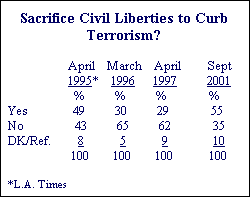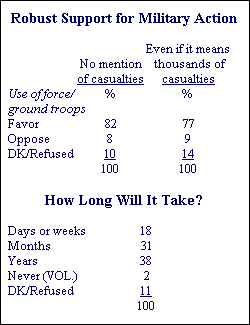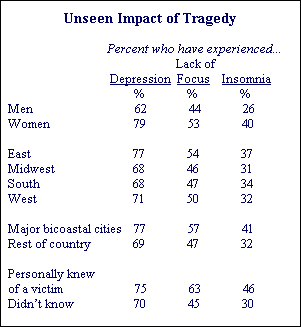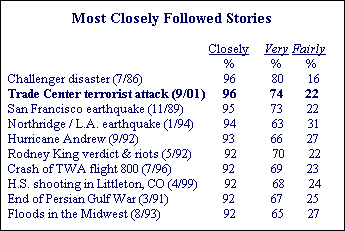Most See Need to Sacrifice Liberties
Even more than was the case after the 1995 terrorist bombing in Oklahoma City, Americans think it will be necessary to give up some civil liberties in order to combat terrorism. A majority (55%) say the average person will have to give up some freedoms in order to prevent such attacks in the future. The only dissent comes from respondents under age 30, where just 40% think restricting civil liberties will be necessary, while 50% disagree.
Sacrifice Civil Liberties to Curb Terrorism?

In the immediate aftermath of the Oklahoma City bombing, roughly half of Americans (49%) felt that sacrificing some civil liberties would be necessary, but this view lost support in the years that followed. By March 1996, only 30% said they thought curbing civil liberties was a necessary step to control terrorism, while nearly two-in-three (65%) said it was not.
Though most see a loss of civil liberties as a necessary step, many have reservations about government action. Nearly as many worry that government action might excessively restrict the average person’s civil liberties (34%) as express concern that the government will not go far enough in enacting strong new terrorism laws (39%).
No Draconian Measures
Despite the expectation that it will be necessary to sacrifice some liberties, the public does not give blanket approval to all possible government responses to the terrorist threat, especially when it involves personal privacy. Seven-in-ten favor a requirement that citizens carry a national identity card at all times to show to a police officer on request, a proposal that has particularly strong support from women (75%). But the public is more dubious when it comes to government monitoring of telephone calls, e-mails and credit card purchases.

A majority (55%) would not favor permitting the government to monitor their credit card purchases, and fully seven-in-ten oppose allowing the government to monitor personal telephone calls and e-mails.
Perhaps most important, Americans clearly reject the establishment of internment camps to round up legal immigrants from hostile nations. By roughly two-to-one (57% to 29%), the public opposes that idea. On each of the measures related directly to civil liberties, college-educated Americans express more concern about restricting freedoms than those with a high-school degree or less.
By contrast, the public is much more willing to remove some of the shackles from the CIA in order to combat terrorism. Fully two-thirds favor allowing the CIA to conduct assassinations overseas when pursuing suspected enemies of the U.S., and an equal proportion are willing to allow the CIA to contract with criminals in pursuing suspected terrorists. Americans under age 50 and men express the strongest support for such actions.
Lengthy Conflict Seen
Americans are not only overwhelmingly supportive of a military response to the terrorist attacks, they are willing to suffer considerable casualties in pursuit of that goal. Fully 82% support military action against the terrorists, including the use of ground forces. Even if this campaign results in the loss of thousands of casualties, 77% back the use of military force.
Robust Support for Military Action

For now at least, most people are willing to be patient in pursuing the terrorists. The president’s admonitions that the military effort will not be quick or easy have connected with the public — a 38% plurality say it might take years to kill or capture those responsible for the attacks, and another 31% believe it will take months. Fewer than one-in-five (18%) anticipate a Persian Gulf War-style conflict that would last only days or weeks.
Significantly, even those who believe it will take years to round up the terrorists still strongly favor military action. While support for retaliation runs strongest among those who see the conflict ending quickly, even among those who think it will take years to capture the terrorists roughly eight-in-ten back the use of military force.
Bush Approval at 80%
As other survey organizations have found, President Bush’s approval ratings have risen to historic heights since the terrorist attacks. Eight-in-ten Americans now approve of Bush’s job performance, up from 51% just a few weeks ago. Bush’s approval mark is on par with the 84% rating his father received in March 1991, shortly after the U.S. victory in the Persian Gulf War.
Even African-Americans, who have for the most part opposed the president, have rallied behind him since the Sept. 11 assaults. Roughly half of blacks (49%) now approve of Bush’s job performance, compared to 32% who backed the president earlier this month.
Bush gets even more favorable ratings for how he has dealt with the terrorist attacks — 85% approve of his performance on that front. And the public gives positive reviews to Bush’s communications efforts during the crisis — but people are even more enthusiastic about the job done by New York Mayor Rudy Giuliani in this area.
Nearly six-in-ten (58%) rate Giuliani’s communication efforts as excellent, and 29% say they have been good. By contrast, fewer than half of Americans (45%) say Bush has done an excellent job of speaking to the nation about the attacks, while another 38% say he has done a good job. The public gives comparable ratings to Secretary of State Colin Powell (43% excellent, 35% good).
Emotional Aftershocks

The tragedy has had a strong emotional impact on most Americans, but women, parents, and urban residents have been among the hardest hit. One-fifth of the public has been affected even more powerfully — they know someone who was killed, injured or is still missing from the attacks, or have a friend or relative who does.
Women are more likely to report feeling depressed than men, or perhaps are more willing to express those feelings. Nearly eight-in-ten women (79%) say they have felt depressed, compared to 62% of all men, and just 55% of men over age 50. More parents than non-parents say they have felt depressed (76% vs. 69%). While those in urban areas are generally more likely to experience such feelings, that is especially true of residents of major cities along the East and West coasts; 77% of this group say they have felt depressed, compared with 69% of those living elsewhere.
Many of the groups that report high levels of depression also are more likely to have experienced other problems, like difficulty concentrating or insomnia. Four-in-ten women have been unable to sleep because of the attacks, compared to only about a quarter (26%) of men. And nearly six-in-ten (57%) residents of bicoastal cities say they have had difficulty concentrating, while fewer than half (47%) of those living elsewhere have experienced the same problem.
Those who actually know someone injured or lost in the attacks — or have a friend or relative who does — have probably borne the greatest emotional toll from the tragedy. Among this group, three-quarters say they have felt depressed and well more than half (63%) report difficulty focusing.
Americans who have direct, or at least indirect, knowledge of the victims tend to be well-educated and have high incomes. Nearly three-in-ten college graduates (29%), and 37% of those with family incomes of above $100,000 annually say they have some connection with one of the victims.
TV Images Shock, Horrify
Americans agree that television news coverage of the attacks makes them sad and frightened — but most watch anyway. Indeed, 63% admit they can’t stop watching coverage of the tragedy, and these people are more likely than others to feel sad or scared over what they are viewing.
Of those who are obsessed by the coverage, better than half (55%) strongly agree that they feel sad while watching, compared with 36% of those who are less addicted to news of the attacks. Similarly, 39% of those who can’t stop watching strongly voice feelings of fear over the coverage. Fewer than a quarter (23%) of those who are able to stop watching TV coverage experience such feelings.
The stronger feelings that many women have in reacting to the tragedy may be tied, at least in part, to their emotional response to television news coverage. Women are more likely than men to register strong feelings of sadness and fear from viewing the coverage.
Parents Concerned Over Coverage

A decade ago, the vast majority of parents had little hesitancy in allowing young children to watch TV coverage of the Persian Gulf War. But today, parents are much more concerned over the effects coverage of the terrorist attacks may have on their children.
Better than half (54%) of parents of children between the ages of five and 12 say they have restricted their children’s viewing of the coverage; just 30% of parents placed restrictions on watching coverage of the Gulf conflict. Perhaps as a result, according to parents, far fewer children are following this story — 48% say their children are paying close attention to news of the attacks, while in 1991, 69% of parents said their children were closely following the Gulf war.
College graduates are more likely to restrict their children’s viewing than those with less education, and more mothers than fathers say they are shielding their children from the coverage. In families where parents know of a casualty from the attacks, 64% of parents are restricting their children’s news viewing, compared with 51% of those who do not have a connection to the tragedy.
Significantly, fewer than half of parents (46%) say their children have expressed fears about the terrorist attacks, about the same as during the Gulf war (43%). But parental restrictions of TV news viewing may have helped keep some children from being frightened.
More Turn to Prayer
The vast majority of Americans (69%) say they are praying more as a result of the attacks. It is far less clear whether people will stop flying, or cancel trips, in response to the crisis.
About a quarter of Americans (24%) say they have considered canceling an airplane trip because of the crisis. That is much larger than the number who voiced similar reservations during the Gulf war (14%). Still, nearly three-quarters of the public is not even considering canceling their air travel plans.
In addition, more Americans than 10 years ago are considering canceling travel plans to a major city (21% now, 11% in 1991). But nearly eight-in-ten (77%) are not thinking of curtailing those plans because of the attacks.
Cable TV Top News Source
Fully nine-in-ten Americans are getting their news about the terrorism attacks from television. As in recent years, more people are turning to cable TV news outlets (45%) than network news (30%) or local TV (17%). Radio, newspapers and the Internet all lag well behind television as a source of news on the crisis.
Interestingly, even Internet users are turning to television news in overwhelming numbers. Nearly nine-in-ten online users (88%) cite television as their top source for news on the crisis, while fewer than one-in-ten (8%) say they get most of their news from the Internet.
Most Stay Tuned
News of the terrorist attacks has become almost a constant presence in the lives of many Americans. Better than eight-in-ten (81%) are keeping a television or radio tuned to the news for updates on the crisis and nearly half (46%) say they read the newspaper more closely. That figure, however, represents a modest decline from the 51% who reported monitoring the papers more closely during the Persian Gulf War.
While the Internet is the main source of news on the attacks for a relatively small minority of Americans, the Web is used frequently for updates on the crisis. One-third of all Americans — and fully half of Internet users — say they go online for updates on the attacks.
But the Internet audience is still getting news updates and information from other forms of media as well, at approximately the same levels as those who do not go online. Roughly the same numbers of Internet users as non-users keep their radios and televisions tuned to news of the crisis (79% online, 82% not online), and read the newspaper closely (46%, 49%).
High Marks for Media Coverage
Overall, the news media receive high marks for their coverage of the terrorist attacks. Nearly nine-in-ten (89%) give the press at least a “good” rating, with a majority (56%) saying the coverage has been excellent. These positive evaluations are consistent across all regions of the country, and all types of respondents.

Among television sources, CNN receives the most votes for doing the best job of covering the terrorist attacks. Just under a quarter (24%) rate CNN’s coverage as best, followed by ABC (14%), the Fox News Channel (12%), and NBC (11%). Of the network sources, CBS trails, with 7% citing it as providing the best coverage of events related to the attacks. This disparity is even more stark when we look specifically at the network news audience. Of those who say network TV news was their primary source of news, 26% and 23% cite ABC and NBC, respectively, as providing the best coverage, while just 11% cite CBS.
Overall, 42% of Americans specifically cited a cable news source as providing the best coverage of the breaking story, while 32% cited one of the three traditional broadcast networks.
Extraordinary News Interest
An overwhelming majority of Americans (74%) are paying very close attention to news about the terrorist attacks, with another 22% following this story fairly closely. Overall interest in this story equals any in the 15-year history of the Pew Research Center’s news interest index, although more Americans (80%) paid very close attention to the crash of the space shuttle Challenger in 1986.

The tragedy has attracted strong interest from every major demographic group, although as with most other news stories, Americans under age 30 are less likely than the general public to follow it very closely (65%).
Among people over age 50, more women than men are following news of the attacks very closely. Better than eight-in-ten women over 50 are paying very close attention to this story, compared to 69% of men in this group.
Perhaps not surprisingly, people living in the East are most likely to follow news of the attacks very closely (80%), followed by those in the South and West (74%). Fewer Midwesterners (69%) are tracking the story very closely.




